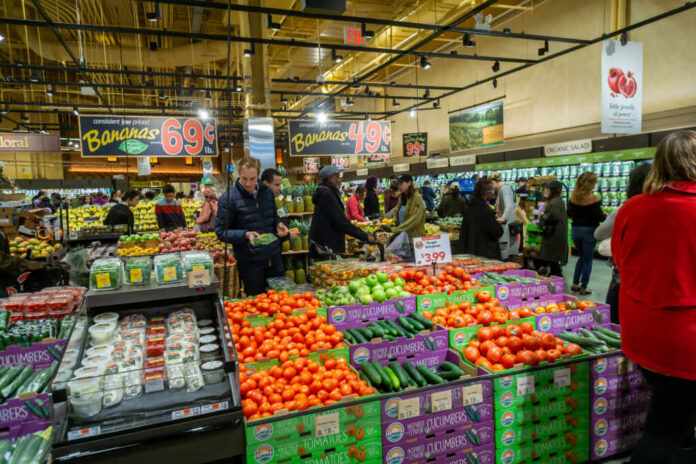
Wegmans, the beloved supermarket chain once known for its personal touch, is now rolling out AI-powered “smart carts” that promise to “transform” your shopping—if you believe the hype, that is—but are we trading good old-fashioned service for yet another tech-driven experiment?
At a Glance
- Wegmans is piloting Instacart’s AI-powered Caper Carts across select New York locations, promising faster, frictionless shopping.
- The move follows the quiet failure of prior scan-and-go tech, which was shelved due to losses and security concerns.
- Only four stores are currently testing the smart carts, as Wegmans weighs customer feedback and potential wider adoption.
- The shift could dramatically impact employee roles, customer privacy, and the very experience that once set Wegmans apart.
Wegmans Rolls Out Smart Carts: High-Tech Convenience or High-Stakes Gamble?
Wegmans, a chain revered for its neighborly charm and attentive service since 1916, has decided the future is here—whether customers asked for it or not. In a move that feels straight out of Silicon Valley’s playbook, the company is piloting Instacart’s “Caper Carts” at four New York stores. These AI-powered shopping carts, loaded with cameras, sensors, and enough tech to make your head spin, are being sold as a game-changer for the in-store grocery experience. But for a company that once prided itself on personal touch, there’s more at stake than just convenience.
Popular supermarket chain adding AI ‘smart carts’ in game-changer for customers: ‘Transforming everyday grocery shopping’ https://t.co/gxiRYU3QBb pic.twitter.com/bFgvZiqzcN
— New York Post (@nypost) July 14, 2025
With the smart carts, customers simply toss items into the basket, watch prices tally up on a screen, and skip the checkout line entirely. Instacart’s Chief Connected Stores Officer, David McIntosh, claims the technology is “transforming everyday grocery shopping into a faster, more personalized experience.” The company insists it’s all about fitting the unique assortment of Wegmans’ offerings and meeting customer needs. But after the crash-and-burn of their last attempt—remember the scan-and-go debacle?—it’s fair to wonder who’s really benefiting here: the shoppers, or the algorithms tracking their every purchase.
A Troubled Tech Past: Lessons Unlearned?
This isn’t Wegmans’ first dance with high-tech checkout. Just two years ago, the chain yanked its “scan-and-go” system after “unspecified losses”—corporate speak for “we got taken to the cleaners.” The grocery industry is no stranger to tech fads and security headaches, as anyone who’s stood behind a malfunctioning self-checkout can attest. Now, with Caper Carts and competing vendors like Shopic in the mix, Wegmans is hoping to get it right. But with only four stores in this latest test run—Dewitt, Perinton, Pittsford, and Alberta Drive—the company is tiptoeing, not sprinting, into the AI future.
The stakes are high. Customers who cherish Wegmans’ friendly staff may soon find themselves interacting more with glowing screens than familiar faces. Employees, meanwhile, are left to wonder whether their roles will shift from helping people to troubleshooting tech. The smart carts may streamline shopping for some, but they also risk deepening the digital divide, leaving less tech-savvy shoppers out in the cold.
Watch a report: AI powered ‘Caper’ shopping carts in grocery stores
Customer Convenience… Or Corporate Data Harvest?
The pitch is seductively simple: keep track of spending in real time, bag as you go, and waltz out the door without waiting in line. For busy families or anyone fed up with endless checkout queues, it sounds like a dream. But there’s more to the story. These smart carts don’t just speed up shopping—they collect mountains of data on what you buy, when, and how. That’s a treasure trove for corporate strategists, but a growing concern for privacy advocates.
Wegmans and Instacart say they’re gathering customer feedback before any wider rollout. Meanwhile, retail analysts are asking the tough questions: Will smart carts cut costs enough to justify the investment? Will losses spike, as with scan-and-go? Or will the human element—the very thing that made Wegmans a household name—be sacrificed on the altar of efficiency?
The Future of Grocery Shopping: Innovation or Overreach?
If the pilot succeeds, Wegmans could become a model for AI-powered retail nationwide, forcing competitors to keep up or get left behind. That sounds impressive, until you remember the real-world fallout: fewer traditional cashier jobs, more customer confusion, and an experience that feels less like hometown shopping and more like navigating a tech start-up. For those of us who value a handshake over a touchscreen, it’s hard not to see this as another well-intentioned “innovation” running roughshod over American tradition.

























